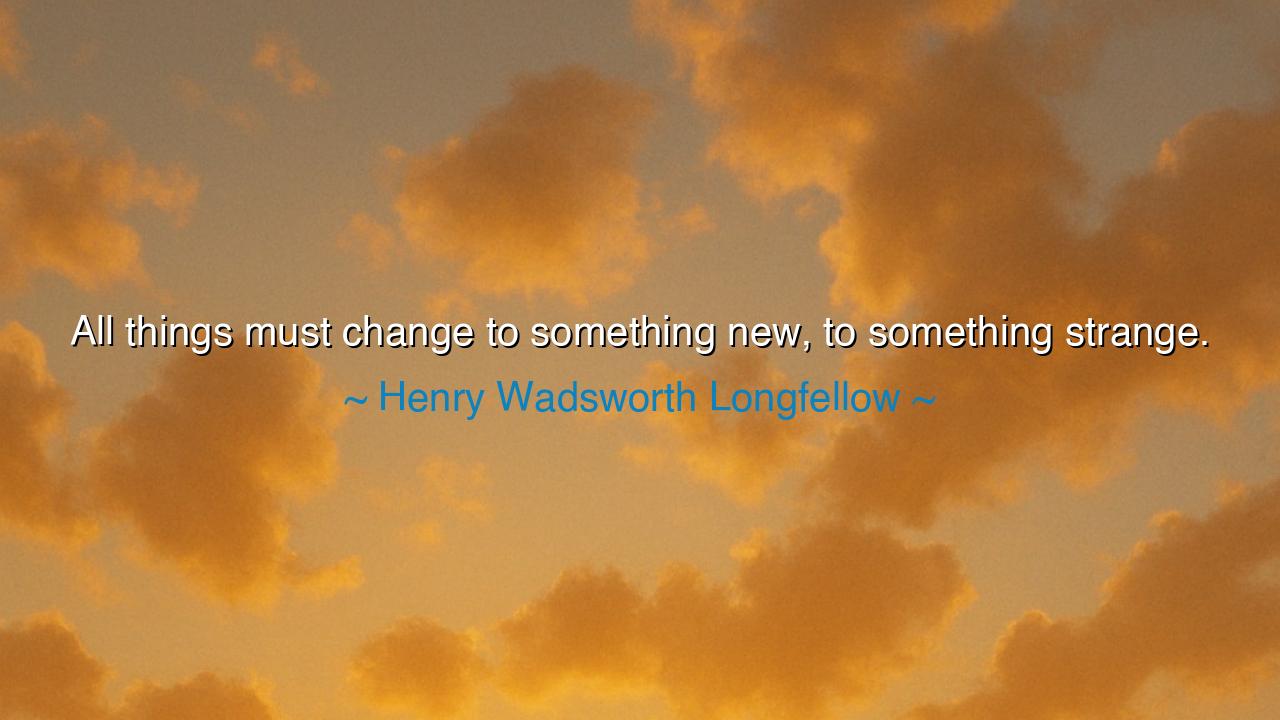
All things must change to something new, to something strange.






Opening Scene
The room is softly illuminated by the warm glow of a table lamp, casting gentle shadows as the evening deepens. Outside, the usual hum of the city fades into a quiet stillness. Jack sits at the table, thoughtfully flipping through a book, while Jeeny stands near the window, gazing out at the cityscape below. There’s a sense of contemplation in the air, as though a conversation about change, adaptation, and the nature of transformation is about to unfold.
Host: After a brief moment of silence, Jeeny turns from the window, her voice steady, but reflective, breaking the silence.
Jeeny: “I came across a quote by Henry Wadsworth Longfellow that really got me thinking. He said, ‘All things must change to something new, to something strange.’ It made me reflect on how much change is a natural part of life, but also how unsettling it can feel. Change often leads us into the unknown, into something that can feel strange or unfamiliar. What do you think? How do you feel about the inevitability of change, and how we navigate the unfamiliar?”
Jack: “I think Longfellow’s quote captures a fundamental truth about life — that change is inevitable. Nothing stays the same forever, and sometimes the things that change are so unexpected or so far outside our comfort zone that they feel strange or even unsettling. But that strangeness is often a sign of growth. The unfamiliar can be uncomfortable, but it’s also where new possibilities lie. Change forces us to stretch, to adapt, and to open ourselves up to new ways of thinking and being.”
Jeeny: “Exactly. And I think that’s where the challenge lies — in how we respond to that strangeness. Change isn’t always easy, and it’s not always welcomed, especially when it pushes us out of our comfort zones. But the beauty of change is that it can lead to new opportunities, new ways of seeing the world, and even new parts of ourselves that we didn’t know existed. It’s about embracing the unfamiliar instead of running from it.”
Jack: “Right. It’s also about how we perceive uncertainty. We tend to fear change because it brings the unknown, and the unknown can feel dangerous or unpredictable. But the truth is, change often opens up doors we didn’t know were there. It’s about how we frame the experience. If we can see the potential in the unfamiliar, we can turn what feels strange into something exciting. It’s like learning a new language or starting a new job — at first, it’s awkward and challenging, but over time, it becomes part of your world.”
Host: The conversation deepens, and Jeeny moves closer, sitting across from Jack. Her voice steady as she continues.
Jeeny: “And I think that’s the key — being open to newness. There’s something deeply transformative about being willing to step into the unknown. When we resist change, we’re also resisting growth. But when we accept that change is part of the natural rhythm of life, we begin to see it as something that can lead us to new discoveries. Even when it feels strange, it’s often the strangeness that carries the most valuable lessons.”
Jack: “Exactly. And I think change also teaches us resilience. The more we face the unfamiliar and learn to adapt, the stronger we become. Each time we navigate a change, we become a little more equipped to handle the next one. It’s the process of transformation, both in the world around us and within ourselves. When we embrace it, we don’t just survive change — we thrive in it.”
Jeeny: “And I think that’s what makes life so beautiful. It’s not static. We’re constantly evolving, adapting, and finding new versions of ourselves through the changes we experience. Every time we face something strange or uncomfortable, it’s an opportunity to grow and reinvent ourselves. Without change, we wouldn’t have the chance to expand, to learn, or to reach new heights.”
Jack: “Right. And I think it’s important to recognize that change isn’t always dramatic. It can be small shifts, little steps forward that take us into new territories. Sometimes the most powerful changes are the subtle ones — the ones that accumulate over time. Each change, no matter how small, is part of the bigger transformation of who we are and how we engage with the world.”
Host: The room quiets for a moment as Jack and Jeeny reflect on the deeper meaning behind Longfellow’s words. Outside, the world continues at its usual pace, but inside, there’s a shared understanding that change is not something to fear, but something to embrace as part of the journey of life.
Jeeny: “So, maybe the lesson here is that change is inevitable, but how we respond to it is where the power lies. Instead of fearing the unfamiliar, we can choose to see it as an opportunity for growth, for expansion, and for new discoveries.”
Jack: “Exactly. Change is like a doorway to the unknown, and it’s through stepping into that space that we learn more about ourselves and the world around us. We can’t avoid it, but we can choose to approach it with an open heart, knowing that the unfamiliar is often the place where the most beautiful transformations happen.”
Host: As the evening continues, the conversation wraps up with a quiet understanding. Change is a natural, inevitable part of life, but it’s also an opportunity to grow and transform. Embracing the unfamiliar — even when it feels strange — allows us to move forward, adapt, and become more resilient. The beauty of life lies not in avoiding change, but in learning to thrive in the face of it.






AAdministratorAdministrator
Welcome, honored guests. Please leave a comment, we will respond soon